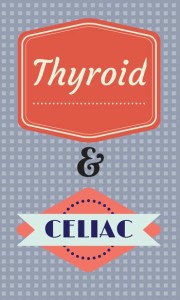 New research presented during Digestive Disease Week this month points to a possible higher celiac connection with some folks who are being treated for hypothyroidism (a.k.a. underactive thyroid – per Mayo Clinic).
New research presented during Digestive Disease Week this month points to a possible higher celiac connection with some folks who are being treated for hypothyroidism (a.k.a. underactive thyroid – per Mayo Clinic).
Dr. Richard S. Zubarik, professor of medicine and director of GI endoscopy at the University of Vermont, Burlington., explained that patients on a high dose (125 mcg or 1.5 mcg/kg) of levothyroxine per day to keep a normal- functioning thyroid gland (aka euthyroid) “should routinely be tested for celiac disease,” Family Practice News reported.
Of the patients tested who took the high dose of levothyroxine, the article says “eight of the 400 patients had an elevated serum tissue transglutaminase level, and seven of the eight were subsequently confirmed as having biopsy-proven celiac disease. Six of the seven patients with celiac disease met or exceeded the levothyroxine dose threshold.”
The article mentions that current guidelines for regular testing for people most at risk for celiac disease includes folks with unexplained anemia. The article mentions people with unexplained anemia “have a celiac disease prevalence of 2.3%-5%. Thus, the 5% prevalence of celiac disease in hypothyroid patients requiring high-dose levothyroxine in order to maintain a euthyroid state is at least as high as, and perhaps higher than, the prevalence in groups having a guideline-recommended indication for testing,” Dr. Zubarik said.
Researchers still don’t know what is causing the connection.
Thyroid and Celiac
Thyroid and celiac issues can both happen in one person. The above research is one example.
The National Foundation for Celiac Awareness (NFCA) reports people with celiac are four times more likely to develop the autoimmune diseases Hashimoto’s Thyroiditis or Graves’ Disease.
Hashimoto’s is an autoimmune hypothyroid condition where your immune system attacks your thyroid and it doesn’t function as efficiently as it should. The thyroid gland produces hormones that coordinate many of your body’s activities, including metabolism, the Mayo Clinic reports. Hashimoto’s is the most common kind of thyroid disease.
Graves’ Disease is the opposite condition. It is an autoimmune hyperthyroid condition. When the immune system attacks the thyroid, it basically goes into overdrive and produces too much of the thyroid hormone. For more info on Graves’ Disease, see this WebMD article.
You don’t have to have Hashimoto’s in order to have hypothyroidism and you don’t have to have Graves’ Disease in order to have hyperthyroidism. Also, having a thyroid condition doesn’t guarantee you have celiac and vice versa. But as mentioned earlier, there is a higher possibility of it happening. Being educated about all of these areas is important in case any symptoms arise.
If you are concerned about thyroid disease, talk to your doctor, watch for symptoms and get tested if needed. Finding a thyroid condition and treating it early is best.
*Disclaimer: I am not a medical professional. Please consult your doctor if you have questions on any of the conditions mentioned above.
Tags: autoimmune, celiac, disease, graves, hashimoto's, hyperthyroid, hypothyroid, research, science, thyroid, thyroiditis



Leave a Reply